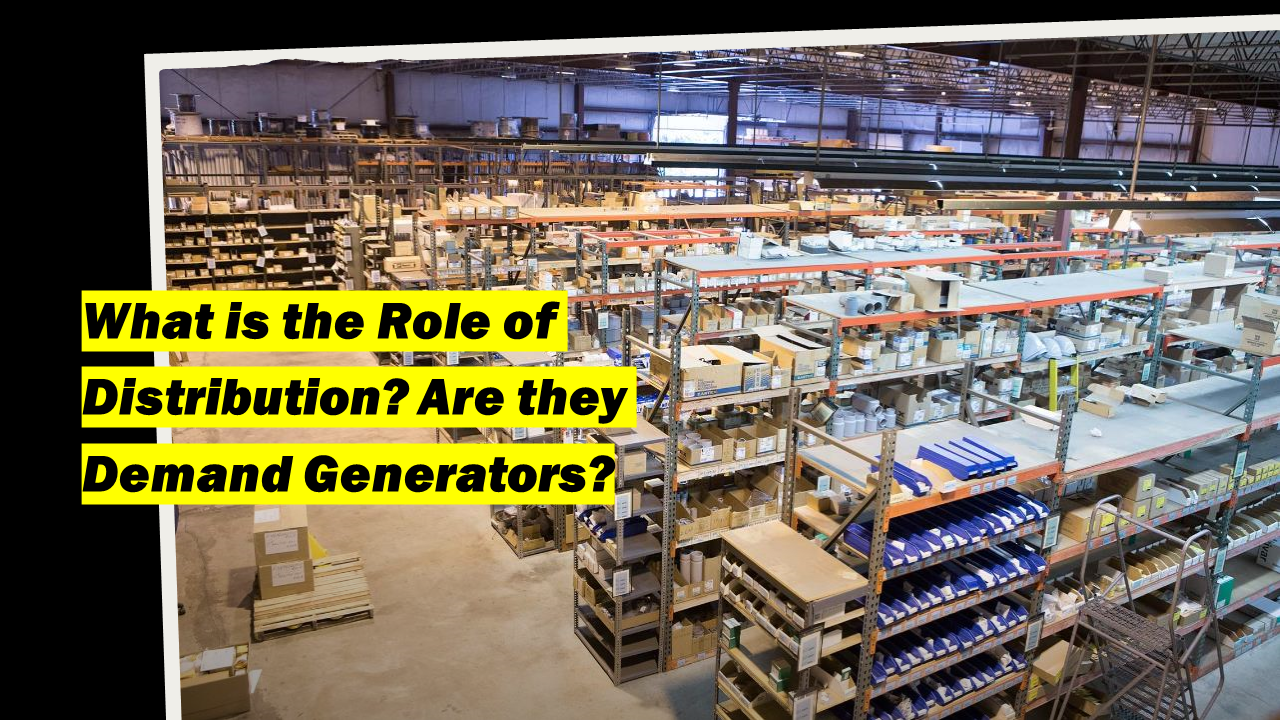
Recently I visited a manufacturer client who asked me about “the channel”. Specifically, they wanted to know:
- “What drives distributor product selection, what is the food chain, what’s the value of each?”
- “Are distributors proactive in creating opportunities and selling our types of products?”
In all transparency, this is a manufacturer who is owned by a PE firm and the person from the PE firm responsible for this manufacturer, ostensibly the portfolio manager and on the BOD of the manufacturer, was asking the question. He was frustrated. They’ve owned the firm from just before the pandemic (so you know, 5+ years in, they are looking to turn the business.) Sales have increased, after the pandemic decline, but not enough for them to generate their desired turn. He was expressing some frustration.
And, as a little background, they focus on a segment of the market that is a niche, but a reasonable size and they have small share. They are project-oriented, more spec or premium-oriented. Their business is “98% driven by customer requests and/or supported by their reps.” Their business is funneled through distribution, which he believes in, but he is wondering, “do / can they go out and generate demand or is that the sole responsibility of the manufacturer and their reps?”
Aside from a discussion of their strategy and recommendations on how to capture share of mind, the broader question becomes
- What is the role of distributors?
- Are / do distributors proactively seek business and promote manufacturers?
Concurrently, in the electrical industry, we recently researched for NEMRA (the manufacturer rep association in the electrical industry) a report called “Manufacturer of the Future.” This is a precursor to research we’re doing for “Rep of the Future” (an update from a 2020 report). NEMRA recently released the report to their members and Channel Marketing Group is authorized to share an Executive Summary of the report (and if you want a copy, email me.)
An independent distributor asked for a copy of the executive summary and then asked:
- “What (does) a manufacturer believe the role of distribution is regarding demand creation, sales strategy, etc.?”
Which is a great question, and no manufacturer will answer honestly to a distributor. Why? Because why should they potentially disenfranchise a customer on the state of distribution (and that distributor could be an exception, albeit, realistically, for only some of their personnel / business.)
The challenge is that these are broad questions where a “one-size fits all” answer is insufficient.
- There are distributor salespeople who will proactively recommend products based upon an understanding of their customer’s needs.
- There are distributor salespeople who are very service oriented and prefer to receive / service orders. (And there are some that “mail it in.”)
- There are distributor salespeople who do both, and it depends upon the customer and the opportunity.
- And there are many customers who are not called upon by a distributor salesperson and learn / know what they need, conduct their own research, and “order” what is necessary or delegate the brand decision to their contractor (hence contractor quotation / bidding and value-engineering opportunities.
So, given that there are “thousands” of distributor salespeople in the market, there are that many ways of answering the question. Unfortunately, distributors are not consistent across their sales platform in supporting a manufacturer. Distributors, and rightly so, are focused on supporting their customer (the source of their income).
And this does not address the variable state of distributor marketing let alone marketing all brands or to all customers. (And I am not suggesting distributors should, just that manufacturers, realistically, should understand that 1) there is a pecking order and 2) they need to fight for share of mind. It is not a “build it and they will come” environment.)
Beyond Distributor Salespeople
Further, manufacturers share that trying to get distributor management, purchasing / supplier relationships, marketing, training, branch managers, inventory management, and salespeople on the same page for a strategy and then execution of the strategy is …. monumental!
With consolidation and the advent of large, and very large, distribution centers, many of the largest distributors are focused on seeking operational excellence because that fits their model.
Few are actively seeking to invest in more outside salespeople (putting more “feet on the street”) to serve more customers. Some of these feel that customer interaction is / should be digital, which is a challenge in creating demand / seeking specifications as digital, inevitably, is customer-driven self-service and/or transactional. There is nothing wrong with this and, in fact, it is a requirement to serve all customers at some point … and customers want this flexibility.
But, from a manufacturer viewpoint, is it the only way to generate demand?
Can Distributors Be Brand Loyal?
One of the findings of NEMRA’s Manufacturer of the Future report is that leading manufacturers want their manufacturer representatives to generate more demand and, in most cases, interact with more contractors / end-users within their market. Our experience in the HVAC market is anecdotally similar.
Manufacturers are looking, longer-term, that consolidation will continue, and that the role of the rep is to help the distributor move product from the distribution center to the user as well as generate demand by creating brand preference so that the distributor will fulfill the brand request.
For every distributor, the “prime directive” is to serve the customer and generate revenue. Without sales, yes, there is no business, so distributors sell either what the customer wants or what will earn them the business. This may conflict with a manufacturer’s goal … promoting “their” product / brand.
In essence, manufacturers question distributor brand loyalty and their ability to help the manufacturer take share within a defined territory.
Assessing if a Distributor is a Demand Generator
As you enter the planning season, consider these two questions:
- What should the role of distribution be regarding demand creation, sales strategy, etc…”
- What are / could be the attributes of a demand generating distributor?
If you’d like more insight on the “Manufacturer of the Future” or to learn how Channel Marketing Group can support you in earning mindshare to capture market share through distributor or, if your a distributor, develop a demand generation engine, reach out to us for a free phone consultation.
Note: If you’d like to acquire a copy of NEMRA’s Manufacturer of the Future, NEMRA does make it available to non-members for only $199.



Leave a Reply